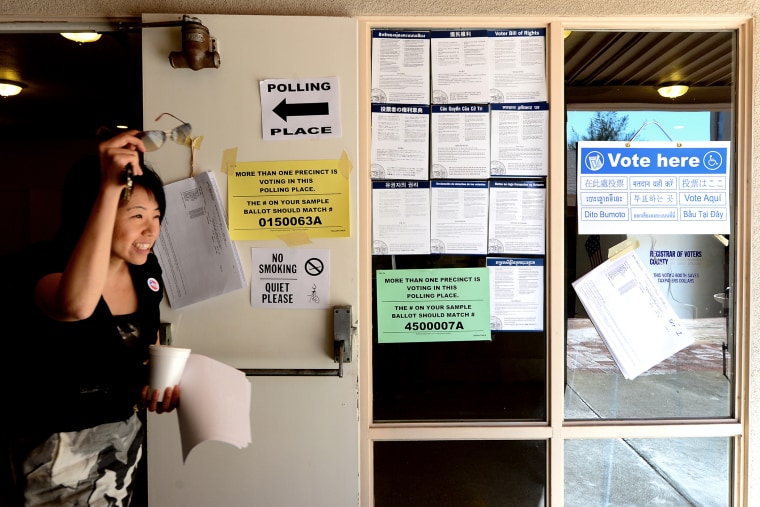Haresh Bhungalia, father of three, has been outed. So have 18 million others. And they’re glad. A new Center for American Progress study finds Asian Americans and Pacific Islanders (AAPI) are more progressive than ever, a potential boon for Democrats for years to come. That’s not what AAPIs are glad about necessarily. They’re simply content that a cogent picture of their current electoral relevance exists.
As Democrats and Republicans have said, AAPI voters helped swing the 2012 election for President Obama, at a rate (73%) that was second only to African Americans. In 2012, former Florida Gov. Jeb Bush noted swing states like North Carolina, Nevada, Florida, Virginia and Ohio could have been won by Republicans if not for AAPIs.
Immigration may be a defining issue for AAPIs in the coming election cycle. During the 2008 election, only 32% of AAPIs supported a path to citizenship. This despite the group sharing the Latino American immigration experience: Three out of four voting-age AAPIs were born abroad, with more than half speaking English as a second language.
Today, one presidential election later, AAPI support for a path to citizenship has nearly doubled to 58%. Bhungalia was undecided up to the very end in 2012. The 39-year old multi-millionaire said he ultimately chose social over fiscal issues and voted for Obama.
This major change after one election cycle may indicate a generational shift in AAPI communities for several reasons. First, older generations that guarded their unauthorized immigration secret (1.3 million AAPIs are here illegally) are passing away. Second, new AAPI immigrant groups are younger, landing during an open civic debate era, cultured by social media, and therefore energized to speak out. Finally, the study’s co-author, Karthick Ramakrishnan, points to Republicans in 2012: “They weren’t talking about Asians, but the anti-immigrant climate made AAPIs feel unwelcome.”
In another potential generational shift, the new report found a majority of AAPIs support bigger government (55%) and higher taxes for the wealthy to reduce the deficit (67%). For two AAPI generations, the assumption was that they disliked government, given that most left or fled oppressive or dictatorial countries. It was also assumed that, because of AAPIs tendency to have higher incomes, they disliked higher taxes. That fed the argument that AAPIs were ripe for Republicans. Instead, if today’s data are correct, they are holding a course parallel with Democratic philosophies on government.
A third revelation are AAPIs' views on diversity. Over a series of eight questions and four different ethnic groups, AAPIs embrace diverse attitudes the most. Nationally, 70% of Americans agreed that “America will learn more from one another and be enriched by exposure to many different cultures;" among AAPIs, 87% agreed. Asked whether they agreed that “With more diverse people working and living together, discrimination will decrease,” the numbers were 61% nationally and 70% for AAPIs.
Traditionally, AAPIs are known to keep to themselves -- at schools, at churches and in communities. And when you consider the sheer number of origins (49, according to the U.S. Census) and languages (hundreds) under the “Asian American and Pacific Islander” category, it’s easy to understand the tribal nature of AAPI roots. But that has changed. Aneesh Raman, former speechwriter for President Obama, says this about early AAPI generations: "Their children, however, have become more eager to take risks, to go into fields that are unstable, to try and broaden the definition of what it means to be Asian American." Most later-generation AAPIs want to be seen as part of America: "Asian American," but not necessarily "Asian in America."
The overwhelming support on diversity issues may partially explains why a plurality of AAPIs twice supported the first African American President. For 2016, this could mean AAPIs would back a diverse candidate like former Secretary of State Hilary Clinton.
To mitigate what this latest data seems to show, Republicans can do several things. First, avoid repeating the divisive, jingoistic rhetoric some corners of the party may favor. Next, specifically address the AAPI community on fiscal concerns -- their willingness to pay higher taxes may be more about them despising debt.
“Like all Republicans, most Asian Americans see debt and deficit spending as issues that will hurt future generations," says Jason Chung, communication director for the Republican National Committee's Asian Pacific American Advisory Council. AAPIs are traditionally the least tied to party affiliation of any group, so there’s opportunity. For now.
That political wanderlust stems in part from the fact that no party has yet embraced AAPIs in a systemic and consistent way, as other constituencies have been. While their vote has swung, it can swing again.
Richard Lui is a news anchor for MSNBC and NBC’s Early Today. Follow him on Twitter at @RichardLui.
